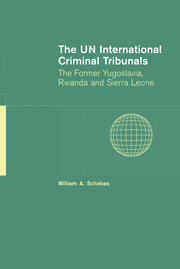Book contents
- Frontmatter
- Contents
- Preface
- Table of cases
- Table of legislative provisions
- List of abbreviations
- PART I Establishment of the tribunals
- PART II Jurisdiction
- 4 Territorial, personal and temporal jurisdiction
- 5 Subject-matter jurisdiction generally
- 6 Genocide
- 7 Crimes against humanity
- 8 War crimes
- PART III Substantive and procedural aspects of prosecution
- PART IV Organisation of the tribunals
- Bibliography
- Index
4 - Territorial, personal and temporal jurisdiction
Published online by Cambridge University Press: 05 June 2012
- Frontmatter
- Contents
- Preface
- Table of cases
- Table of legislative provisions
- List of abbreviations
- PART I Establishment of the tribunals
- PART II Jurisdiction
- 4 Territorial, personal and temporal jurisdiction
- 5 Subject-matter jurisdiction generally
- 6 Genocide
- 7 Crimes against humanity
- 8 War crimes
- PART III Substantive and procedural aspects of prosecution
- PART IV Organisation of the tribunals
- Bibliography
- Index
Summary
Article 1 of each of the three statutes consists of a provision entitled ‘Competence of the International Tribunal’. This would seem to be a Gallicism; in French, the word jurisdiction is translated as compétence, and this is of course also an English word, but with a somewhat different meaning. Jurisdiction is the better word. The three provisions state: ‘The [tribunal] shall have the power …’ What follows is a provision outlining the territorial and temporal jurisdiction of the tribunal, and then a series of articles defining the crimes over which the tribunals have jurisdiction. Jurisdiction has been defined as ‘the power of a court to decide a matter in controversy and presupposes the existence of a duly constituted court with control over the subject matter and the parties’. The three tribunals cannot prosecute cases involving individuals, territories and crimes that are not either explicitly or implicitly within their powers, that is, their jurisdiction.
Primacy
Before addressing the specific issues concerning territorial, personal and temporal jurisdiction, some attention must be paid to potential conflicts of jurisdiction and the correct approach to their resolution. All three statutes declare, in provisions entitled ‘concurrent jurisdiction’, that they ‘shall have primacy’ over national courts. The ICTY and ICTR statutes refer to concurrent jurisdiction, but they do not say with whom. The SCSL Statute speaks of concurrent jurisdiction with ‘the national courts of Sierra Leone’. The ICTY Statute says it ‘shall have primacy over national courts’.
- Type
- Chapter
- Information
- The UN International Criminal TribunalsThe Former Yugoslavia, Rwanda and Sierra Leone, pp. 123 - 150Publisher: Cambridge University PressPrint publication year: 2006



